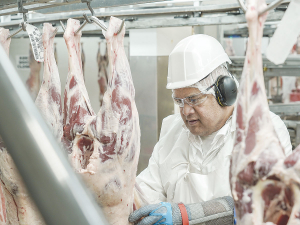Meat Industry Association CEO to Step Down
The Meat Industry Association of New Zealand (MIA) today announced that Chief Executive Officer Sirma Karapeeva has resigned from the role.
 Despite all the difficulties, NZ’s red meat exports still exceeded $3 billion during the first quarter of 2022.
Despite all the difficulties, NZ’s red meat exports still exceeded $3 billion during the first quarter of 2022.
While global demand and prices for red meat remain strong, supply chain disruptions and significant processing constraints in New Zealand are having an impact.
Meat Industry Association chief executive Sirma Karapeeva says one of the big issues is the severe lockdown in the key Chinese port of Shanghai. She told Rural News that sheepmeat exports to China were down by 46% and beef by 7%. However, she adds that beef exports to Chin still represented the third highest March volume on record.
"The slowdown in meat exports to China was not NZ-specific, as Chinese import data shows that there was a drop in the volume of all meat imports into China in March," Karapeeva explains. "Probably reflecting the impact of the various lockdowns and port disruptions."
She says the increase in exports to markets other than China, including good volumes to Malaysia and Saudi Arabia, demonstrates how agile NZ exporters are. Karapeeva says companies have sound strategies in place to manage different markets depending on the global conditions.
Despite all the difficulties, NZ red meat exports exceeded $3 billion during the first quarter of 2022. Total exports for the quarter totalled $3.1 billion, a 17% increase on the same period in 2021. Exports to most markets increased, apart from China, which dropped 1% to $1.2 billion.
Red meat exports during March were worth $1.15 billion, increase on March 2021. The value of exports to China dropped 17% to $384m during March, but nearly all other major markets saw an increase.
During March, overall meat exports to the US rose 48% to $288m and the sector saw a record monthly volume of sheepmeat exports to the US (4,295 tonnes worth $83.4m). Overall exports to the UK rose by 22% by value ($65m) and by 18% to Japan ($50m). However, chilled sheepmeat exports to the UK fell by 80% year-on-year to 433 tonnes, reflecting the ongoing logistics issues with transporting chilled products.
Meanwhile, Karapeeva says the chronic labour shortages in NZ continue to be a problem with cattle processing down 11% during the first quarter and sheep processing down 16% compared to 2021. However, processing capacity has since improved.
She says processors are also having to ensure they align livestock volumes at plants with their ability to ship products to markets in the face of the widespread ports congestion, container availability issues and vessel delays.
New Zealand and Chile have signed a new arrangement designed to boost agricultural cooperation and drive sector success.
New DairyNZ research will help farmers mitigate the impacts of heat stress on herds in high-risk regions of the country.
Budou are being picked now in Bridge Pā, the most intense and exciting time of the year for the Greencollar team – and the harvest of the finest eating grapes is weeks earlier than expected.
The Real Estate Institute of New Zealand (REINZ) has released its latest rural property report, providing a detailed view of New Zealand’s rural real estate market for the 12 months ending December 2025.
Rural retailer Farmlands has released it's latest round of half-year results, labeling it as evidence that its five-year strategy is delivering on financial performance and better value for members.
OPINION: "We are back to where we were a year ago," according to a leading banking analyst in the UK, referring to US president Donald Trump's latest imposition of a global 10% tariff on all exports into the US.

OPINION: A mate of yours truly reckons rural Manawatu families are the latest to suffer under what he calls the…
OPINION: If old Winston Peters thinks building trade relations with new nations, such as India, isn't a necessary investment in…